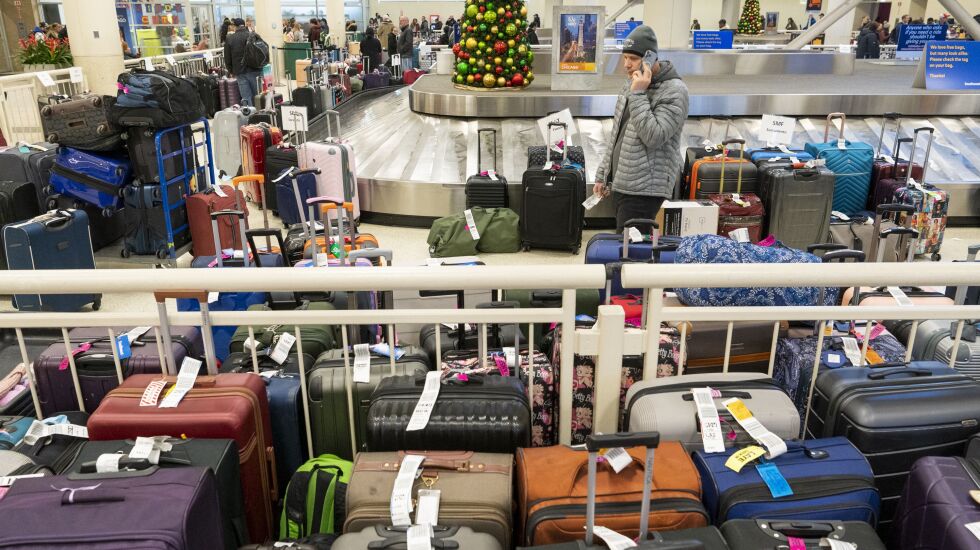
Chaos descended upon the nation’s airports as busy holiday travel met a vicious winter storm, but most airlines got their operations back on track as the weather cleared.
Not Southwest.
The Dallas-based airline continued canceling flights Tuesday, with more than 2,600 U.S. flights canceled as most other carriers slashed fewer than 100, according to flight tracking website FlightAware. Around 64% of Southwest’s flights were canceled Tuesday, with another 21% delayed, leaving thousands of travelers stranded and frustrated.
More than 2,500 of the airline’s flights Wednesday are canceled, and more than 1,400 of Thursday’s flights have already been scrubbed, the Associated Press reports.
“With consecutive days of extreme winter weather across our network behind us, continuing challenges are impacting our Customers and Employees in a significant way that is unacceptable,” a statement on Southwest’s website reads. “And our heartfelt apologies for this are just beginning.”
Analysts say one cause of the snarls is the way Southwest runs flight operations. Where many big carriers run on a “hub-and-spoke” basis, Southwest employs a “point-to-point” operating system.
The hub-and-spoke model feeds shorter flights back and forth into larger airports. The point-to-point system has planes going from destination to destination in the same direction.
The hub-and-spoke airlines often have a plane waiting for customers, but point-to-point airlines can leave customers waiting for planes to arrive, according to Robert Mann, a former airline executive and airline consultant of 25 years.
“We are not a hub and spoke carrier; we have 30+ airports with high flight volume so our solution to normalize the operation looks very different from other carriers,” Southwest spokesman Chris Perry said in an email to the Chicago Sun-Times.
Denver and Chicago Midway, badly impacted by the winter storm, are major Southwest bases of operations.
Mann and others say additional reasons hurting Southwest are its mandatory overtime policy for employees and a manual reset of an entire staffing and scheduling system, where most airlines use a quicker, automated method.
“It was impossible for a manually operated and structured system to handle this size of event,” Mann said. “Because it takes so long to generate a solution manually, the only way you can do that is to shoot to do it two or three days down the road and kind of sucking it up between now and then.”

In addition to its mandatory overtime policy, which Mann said left crew members burned out by the end of the year, the combination of flu, COVID-19 and RSV led to an increased number of employees calling out sick.
Adding to Southwest’s struggles is that unlike other major carriers like Delta Air Lines, American and United, which routinely swap tickets with other airlines, Southwest does not exchange tickets, leaving travelers at the mercy of Southwest.
“So we’ve been chasing our tails, trying to catch up and get back to normal safely, which is our No. 1 priority, as quickly as we could,” Southwest spokesman Jay McVay said at a news conference in Houston. “And that’s exactly how we ended up where we are today.”
Mann said some Southwest employees were already so strained from months of working mandatory overtime that when the time came to come into work during a winter storm at the holidays, many chose to simply quit.
“You’ve got a tired workforce, a frustrated workforce, then you throw the weather event on top of it, and those same people who were told to show up in subzero temperatures just say ‘Forget it, not worth it,’” Mann said.


The situation was dire enough to draw the scrutiny of the federal government.
The Department of Transportation said in a tweet it will look into the airline and determine whether the company is complying with customer service standards.
USDOT is concerned by Southwest’s unacceptable rate of cancellations and delays & reports of lack of prompt customer service. The Department will examine whether cancellations were controllable and if Southwest is complying with its customer service plan.
— TransportationGov (@USDOT) December 27, 2022
It’s unclear when Southwest flights will be largely back on track, but the airline is running only around one-third of its normal flight schedule through at least Thursday, according to Perry, the company spokesman.
In Chicago, baggage claims overflowed with luggage at Midway Airport. Many bags were many states away from their owners, check-in lines wound around the airport and stressed-out travelers longed to be on their way.
For those Southwest customers turned stranded travelers on their post-Christmas trek, Mann advised patience and a little bit of hope. If that doesn’t work to get you on a flight, “bite the bullet, pull out your wallet and buy a ticket on another airline,” he said.







